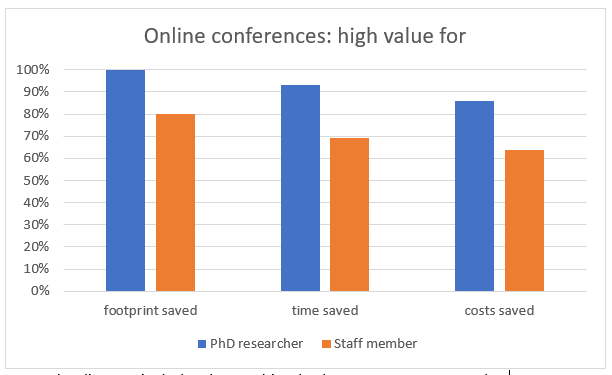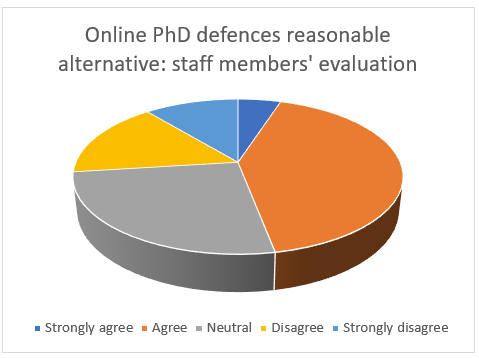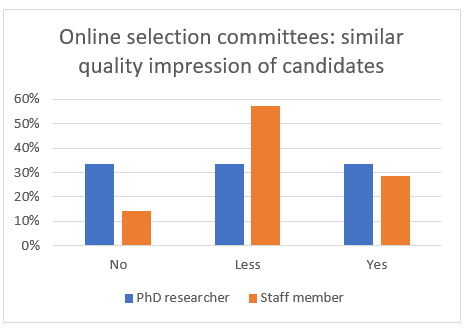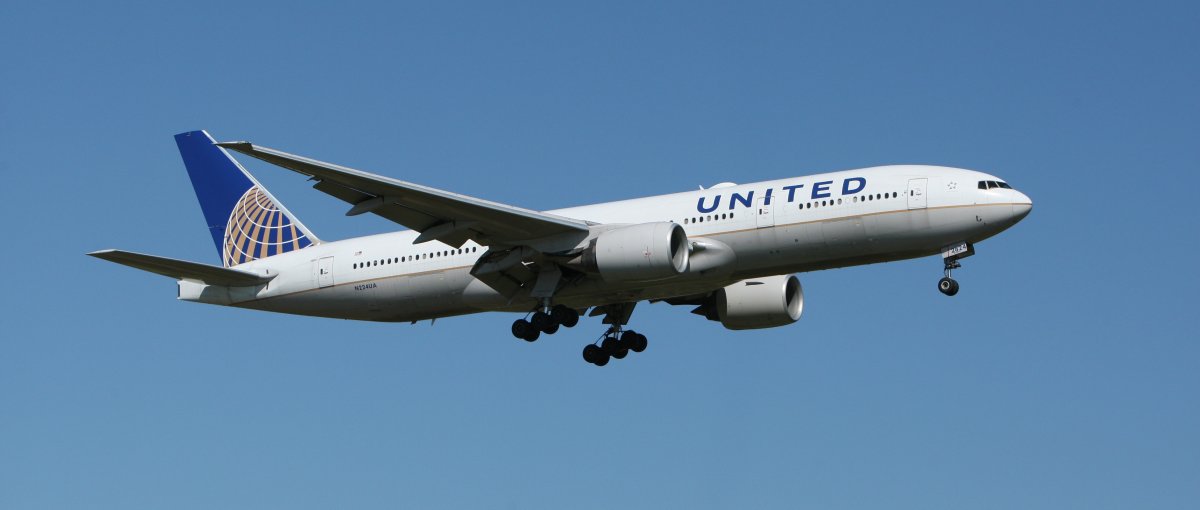Reconsidering academic air traffic in the era of climate change
The COVID-19 pandemic reduced air traffic in a way that was previously thought impossible. Our ecological footprint from air travel reduced to almost zero.
- What will our academic mobility look like when things gradually return to normal after the pandemic?
- Will it be business as usual again, will there be catch-up reaction, or will we markedly change how we travel?
- How viable are online alternatives for conferences, fieldwork or PhD defences?
Findings from a survey and Focus Group Discussion amongst ISS staff and PhD researchers sheds light on these questions.
Reconsidering academic air traffic in the era of climate change
Development studies scholars have actively studied implications of climate change, as well as adaptation and mitigation strategies, in societies across the world. They have actively been involved in advocacy for climate action. More recently, the realization arose that we can also very directly combat climate change by reducing carbon emissions related to our academic endeavours.
Following an initiative in Scandinavian academia, in March 2019, Dutch scholars wrote a letter calling for climate action by their universities to reduce their ecological footprint. This letter, signed by almost 1,300 staff members, was subsequently endorsed by all the Dutch universities. Whereas considerable action has been taken to bring down emissions by, for instance, campus facilities shifting to green electricity and waste recycling, emissions from academic mobility have not significantly reduced, an inventory of Dutch universities’ climate action shows. As flights account for a considerable part of the total CO2 emissions of Dutch universities, constituting 27% for Erasmus University Rotterdam, debates and calls for action now put the spotlight on academic air traffic.
In late 2020, the Dutch Young Academy issued a report entitled Flying high but flying less, which calls for much more action, based on an inventory of the flight policies of various Dutch universities. A post on the ISS blog BLISS, argued that ‘it’s time for flying to become the new smoking’. More recently, another post discussed whether the travel restrictions which were in place during the lockdowns will induce a longer-lasting change in flying behaviour.
The ISS climate group, KISS (Klimaat (=Climate) at ISS), consisting of staff and students, aims to bring down ISS’ CO2 footprint and stimulate awareness about the issue. In June and July 2021, KISS conducted a survey and a focus group discussion to explore how ISS scholars have experienced online alternatives to flying and to what extent these can be considered realistic possibilities for the future. The survey covered a wide array of academic activities, such as conference participation, PhD defences, job selection and fieldwork.
Conferences. Probably the most frequent reason for which academics fly. 60% of the respondents felt that the online conferences they participated in constituted a reasonable alternative (19% responded neutral and 21% disagreed). In terms of the value of online conferences, the reductions in ecological footprint scored highest, followed by time and cost savings. A higher level of inclusiveness of online conferences, due to lower conference fees and travel costs, was also appreciated. It was noted that for instance the bi-annual EADI conference hosted last July by ISS in an online format, attracted many more participants from the global South than previous ones. Conversely, the predominantly online format of conferences in the past 1.5 years, has allowed ISS scholars to attend more conferences than would have been possible otherwise.

A major downside of the online format is the lack of informal conversations over coffee, lunch and dinner. Another disadvantage of attending from home or office is that participation is more selective, with other work continuing, making it more difficult to stay focused and remain involved. Finally, there were concerns about whether participating in online conferences will generate sufficient visibility to advance ones career, as compared to physical presence with opportunities for informal networking over coffee. For example, some large academic conferences in the US also function as venues for job interviews and a study amongst academic staff in Australia (Nursey-Bray et al 2019) found a marked ‘fear of not flying’, related to the perceived risk of losing out on opportunities to make oneself visible at the relevant international academic events. The 2019 MA study by ISS student Lara Vincent among ISS scholars, also points in this direction. Nursey-Bray and co-authors conclude that individual concerns about climate change are insufficient to drive transformation in a wider academic system that heavily incentivises air travel. Institutional change is therefore needed for a reduction in flights to occur, they argue. A key question for the coming period will be whether the advantages of being more inclusive, getting input from a wider range of participants and the advantage of being less time consuming and costly, will be outweighed by the advantages of in-person conferences.
PhD defences. Of the various scholarly activities examined, the evaluation of the online alternative is most positive for PhD defences. Almost half of the staff members who responded see online defences as a reasonable alternative and another third are neutral. In the post-lockdown period, ISS is encouraging hybrid defences with discussants from outside the EU attending online.

PhD researchers mentioned that an online defence can be attractive for candidates whose family members cannot come to The Hague, allowing them to attend the ceremony virtually and celebrate together later. In the focus group discussion, PhD researchers indicated that a flexible policy would be best, as some PhD researchers would prefer their friends and family to come over and experience the ISS.
Job interviews. Less than a third of the staff members and PhDs felt that the online selection of colleagues generates a similarly good impression of candidates compared to live meetings. The reduced effectiveness of non-verbal communication seems particularly problematic here. A two-step interview may provide a solution here with a first round online followed by live interviews with the most promising candidates.

Fieldwork. Primary data collection, and especially qualitative research, is probably the sphere in which online formats most frequently fall short of the desired aims. As one of the participants in the focus group discussion noted, within development studies fieldwork in faraway places constitutes our ‘lab’ and is essential for research. A PhD researcher remarked that online interviews were a reasonable alternative to live interviews, particularly is the interviews are formal and the interviewees speak English. More informal interviews, or more difficult to reach groups, make this option less suitable.
Towards solutions: hybridity, ground transport and ‘mindful travel’
Overall, the research shows that the perceived viability and desirability of online alternatives varies markedly across the various academic tasks/activities.
Replacing live PhD defences with an online format constitutes the low hanging fruit in terms of reducing emissions from flying. The emissions are considerable for just 15 minutes of asking questions by a discussant. Moreover, online or hybrid workshops or conferences entail additional benefits such as less travel time and costs and more inclusiveness in terms of participation.
At the other end of the continuum, the reduction of emissions with regards to travel for fieldwork is much more complicated. Fieldwork requires a great deal more thinking and adaptation in order to reduce the ecological footprint, while maintaining high quality, engaged fieldwork. Such in-person fieldwork is very refreshing and fulfilling, as one of the participants in the Focus Group Discussion mentioned (and probably constitutes the reason why many development studies scholars opted for this profession in the first place).
What options then would be feasible/possible for scholarly activities for which online substitutes fall short? The research suggests a range of directions and actions.
Hybridity.
Rather than a dichotomous choice between offline (as was the norm pre-corona) versus online (as was the practice during the pandemic), hybridity might become the new reality. Hybridity can take various forms, such as some of the members participating online, in a largely physical event. For example, the international Degrowth conference organized at ISS last August, had a programme consisting of live, online and fully hybrid panels. It might also mean that part of the field research takes place offline, with selective interviews being conducted online. Conferences might shift to a format with decentralized regional ‘satellite’ conferences and an online umbrella conference.
For activities where an online substitute is problematic, such as for fieldwork, a palette of various actions and modifications might be considered together. An action which ISS and several other universities have taken is to offset the carbon emissions of flights. Offsetting would be no good if it were used as an excuse to continue with business as usual, but it can be a useful ingredient within a broader array of measures, particularly for flights that are considered essential and for which ground transportation is not an alternative.
Ground transport. A policy that has recently been applied by several universities, following the example of Ghent University, is to stop reimbursement of airline tickets for medium range distances (typically up to 500-600 km) that can be reached by train. Erasmus University Rotterdam is currently also looking into such a policy.
Mindfull travel. The focus group also suggested ‘mindful’ travel as an option. This encompasses giving more thought to how various activities (such as fieldwork, conference visits or international research team meetings) can be clustered and combined within one trip.
Conclusion
The conjuncture of growing attention for the impact of flying on climate change and the COVID-19 pandemic has created a major impulse to the debate on sustainable academic travel. The latest IPCC report, and the unprecedented scale of climate change-induced disasters such as floods and wildfires last summer, are stark reminders of the urgency. During the pandemic, academics quickly became accustomed to online alternatives to flying, and such alternatives, next to obvious limitations, also have various tangible advantages in addition to a lower footprint. The challenge is to find the right mix of solutions for academic activities to create a new normal with less flying.
Reconsidering academic air traffic in the era of climate change
ISS climate group - KISS
In alphabetical order: Wieke Blaauw, Susana Chang Espino, Thea Hilhorst, Ella Kyeremaa, Mark Lammerts, Irene Lopez Ayala, Irene van Staveren, Oane Visser, Femke van der Vliet
